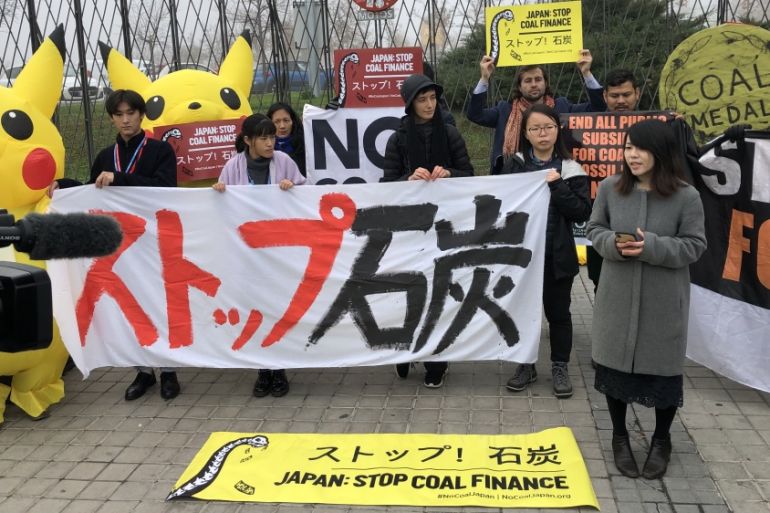Pokemon protest: Activists at COP25 slam Japan coal plants
Climate advocates reject Japan’s embrace of dirty fossil fuel for energy security at home and money-making abroad.

Madrid, Spain – At the hulking convention centre on the outskirts of Madrid where the United Nations is hosting the COP25 climate conference, protesters may be struggling for attention.
But on Tuesday, a coalition of activists demonstrated in an eye-catching way outside the IFEMA exhibition hall – next to the metro stop connecting this suburb of the Spanish capital to the city centre.
Keep reading
list of 4 items‘Unbearable’: Will 45C heatwaves affect who India chooses in election?
Thousands evacuate as wildfire grows ‘dramatically’ in western Canada
Photos: Flash floods in Afghanistan devastate lives and livelihoods
Festooned with blow-up yellow Pikachu outfits from the globally popular Pokemon series to symbolise Japan, a motley assortment of climate advocates chanted in unison: “Stop coal finance, stop coal finance”.
One protester initiated a call-and-response refrain: “When I say climate, you say justice”. And then a Spanish-speaking activist, in a nod to the location of the UN climate gathering, led a group chant of “adios, adios, no al carbon”, which translates as “bye, bye, no to coal”.
The No Coal Japan umbrella group of civil society organisations rallied to demand that the Japanese government and corporations end support for 3,700 megawatts of coal-fired power abroad.
Last week, the coalition published an advertisement in the Financial Times with an illustration of Japanese Prime Minister Shinzo Abe with a “coal medal” around his neck, saying “to win the race, lose coal”.
The call to move beyond coal comes as many countries and financial institutions have heeded UN Secretary-General Antonio Guterres‘s push to end new construction of plants burning the polluting fossil fuel by 2020.
Japan remains the world’s second-largest financier of overseas coal power and continues to plan more units in Japan, as well.
The protest focused on $4.8bn in Japanese ventures in Indonesia, Bangladesh and Vietnam, which have stoked anger among environmentalists.
“Japan is exporting pollution and endangering public health overseas by funding coal-fired power plants that wouldn’t meet the strict emissions standards it imposes at home,” said Muhammad Reza, coordinator of KRuHA, the People’s Coalition for the Right to Water in Indonesia.
‘Stop them now’
In the last two years, the Japan Bank for International Cooperation approved financing for the Cirebon 2 coal plant in Indonesia and the Van Phong 1 coal plant in Vietnam. The bank is also currently considering additional plants in those countries.

Hanae Takahashi, an activist with Friends of the Earth Japan, told Al Jazeera that the protest was more “about coal outside Japan, but yes, we still have working coal-fired plants”.
“After Fukushima, we had about 50 new coal fired-plants planned,” she said. “But because of attention to climate change, 15 projects were cancelled, we have 15 new [operational] projects, and 15 are being constructed.”
Japan currently has about 46,000 gigawatts of coal power, with over 10,000 gigawatts more being planned – at a capital cost of some $29bn. Despite some signs that Japan is gradually becoming more ambitious with regards to its effort to curb climate change, Tokyo is investing heavily in coal.
“Phasing out existing coal now is not easy. It’s 30 percent of the energy mix,” said Kimiko Hirata, international director of the Kiko Network, which is part of the No Coal Japan coalition.
“We cannot stop it all right away. But by 2030 … it is possible to phase out,” she told Al Jazeera on the phone from Tokyo.
She added that her group believes it is feasible to stop new coal projects, and suggested that natural gas is a bridge fuel on the road to more renewable sources.
“Coal power is a priority for us because of its carbon intensity and toxic pollutants,” said Hirata.
Shinjiro Koizumi, Japan’s Minister of the Environment, told the UN gathering on Wednesday in Spain that he was fully aware of global criticisms.
“UNSG [Guterres] called for stopping our addiction to coal,” Koizumi said from the dais. “I took this as a message to Japan.”
Though he added that he had no updates to share on the country’s coal policy, Koizumi
mentioned that Japan is one of two countries in the G7 that have reduced greenhouse gas emissions five consecutive years.
He also mentioned that Japan recently joined the Carbon Neutrality Coalition, saying he hoped to change international perceptions and stop the coal issue from overshadowing Japan’s progress.
Later on Wednesday, during a news conference, Koizumi said that anti-coal voices within the international community were “getting stronger and stronger” since he took office.
But he also pointed to efforts to cut back on plastic bags and high rates of bottle recycling as examples of Japanese achievements. Koizumi also cited the large number of zero-carbon cities: 28 have announced their intention to reach neutrality by 2050, collectively accounting for 35 percent of Japan’s population.
Koizumi has been billed by some commentators as a potential future leader of the nation, but his political future could be partially staked on whether he can persuade the rest of his government to reverse course on coal.
However, Koizumi is quick to argue that Japanese turbine technology is the cleanest and most efficient way to burn coal.
‘Technology from the 19th century’
“Many companies in Japan just haven’t paid attention much to climate or sustainability issues,” said Atsushi Sato, chief analyst in the Environment and Energy Department at Mitsubishi UFJ Research and Consulting Co.
Attending his 15th UN climate conference, the researcher for the Greenhouse Gas Inventory Office of Japan told Al Jazeera that “two out of the three biggest Japanese banks still invest in coal projects”.
But Sato predicted that in five years they will no longer be doing so, with newfound awareness of climate concerns.

He also said that Abe’s government is sympathetic to business interests, which could help explain support for the Japanese coal projects in other parts of Asia.
Domestically, wind and solar are not viewed as reliable enough energy sources yet, Sato said. So, with nuclear power still provoking major safety fears, coal is seen as the worst-best option to meet the energy needs of the world’s third-biggest economy.
Collin Rees, a campaigner at Oil Change International who spearheaded the coal protest, said that it was “absolutely embarrassing” for Japan to contribute so mightily to global warming.
“Japan doesn’t need these dirty coal plants,” said Rees. “Japanese companies for centuries have innovated in their fields. There’s no reason to stick to a technology from the 19th century in the 21st century.”